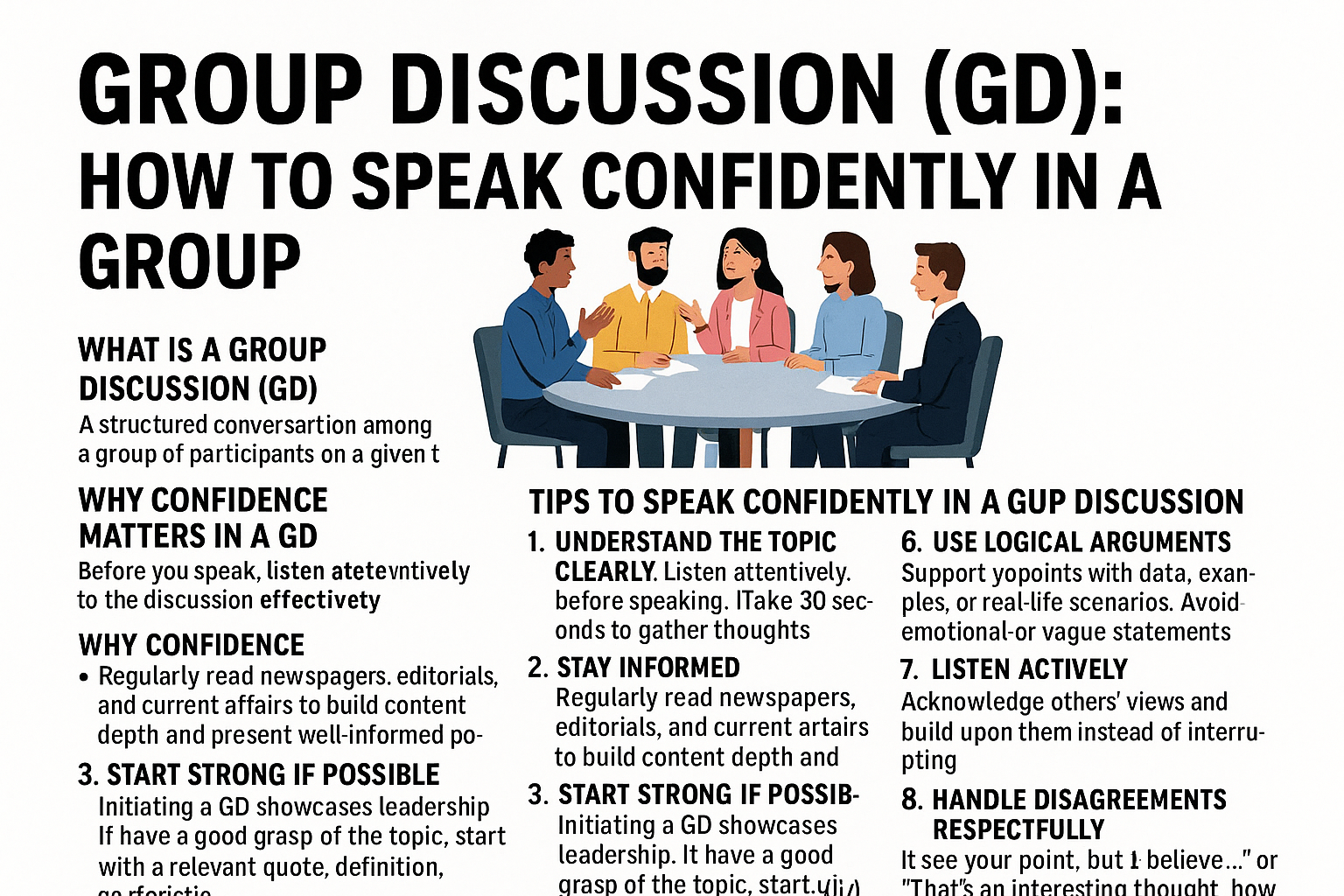Group Discussion (GD) is a crucial selection tool used in various competitive exams, SSB interviews, MBA entrances, and job placements. It tests a candidate’s communication skills, confidence, leadership, teamwork, and clarity of thought. Speaking confidently during a GD is not just about fluency in English, but also about clarity, assertiveness, and engagement.
In this comprehensive guide, you’ll learn practical tips to enhance your confidence and performance in Group Discussions.
WHAT IS A GROUP DISCUSSION (GD)?
A Group Discussion (GD) is a structured conversation among a group of participants on a given topic. It usually lasts for 15–20 minutes and evaluates:
Communication ability
Leadership and teamwork
Analytical and logical thinking
Knowledge and awareness
Confidence and body language
Whether it’s for SSB, MBA, or corporate interviews, confidence plays a key role in leaving a lasting impression.
WHY CONFIDENCE MATTERS IN A GD
Confidence reflects your belief in your ideas and your ability to engage with others. In GDs, it helps you:
Express thoughts without hesitation
Initiate or conclude the discussion effectively
Handle disagreements respectfully
Influence the group with logical points
TIPS TO SPEAK CONFIDENTLY IN A GROUP DISCUSSION
1. UNDERSTAND THE TOPIC CLEARLY
Before you speak, listen attentively to the topic. If needed, take 30 seconds to gather your thoughts. A clear understanding helps in framing a logical structure.
2. STAY INFORMED
Regularly read newspapers, editorials, and current affairs. This builds content depth and helps you present well-informed points.
3. START STRONG IF POSSIBLE
Initiating a GD showcases leadership. If you have a good grasp of the topic, start with a relevant quote, definition, or statistic.
4. MAINTAIN POSITIVE BODY LANGUAGE
Sit upright and maintain eye contact with group members
Use hand gestures naturally
Avoid nervous habits like shaking legs or biting nails
5. BE CLEAR AND CONCISE
Speak in short, clear sentences. Don’t rush or use complex vocabulary. Aim for clarity over flamboyance.
6. USE LOGICAL ARGUMENTS
Support your points with data, examples, or real-life scenarios. Avoid emotional or vague statements.
7. LISTEN ACTIVELY
Confidence is also about being a good listener. Acknowledge others’ views and build upon them instead of interrupting.
8. HANDLE DISAGREEMENTS RESPECTFULLY
If you disagree, use polite expressions like:
“I see your point, but I believe…”
“That’s an interesting thought, however…”
This reflects maturity and control.
9. PRACTICE REGULARLY
Join mock GDs, debate clubs, or discussion forums. The more you practice, the more natural and confident you’ll become.
10. STAY CALM UNDER PRESSURE
Even if someone else is dominating or if you fumble, take a breath and regroup. Confidence also means composure under stress.
COMMON MISTAKES TO AVOID IN GDS
Interrupting others aggressively
Speaking too much or too little
Being disrespectful or dismissive
Using incorrect facts or making up data
Showing overconfidence or arrogance
FINAL THOUGHTS
Speaking confidently in a group discussion is a skill that combines preparation, practice, and presence of mind. Focus on building content, improving delivery, and developing active listening. With time and experience, you’ll be able to speak with poise, clarity, and impact.
FREQUENTLY ASKED QUESTIONS (FAQ)
Q1. HOW CAN I IMPROVE MY COMMUNICATION SKILLS FOR GD?
Start by reading regularly, watching debates, and speaking in front of a mirror. Practice with peers and join speaking clubs to gain real-time experience.
Q2. IS IT NECESSARY TO SPEAK IN ENGLISH DURING A GD?
Most formal GDs are conducted in English, especially for exams and corporate roles. However, some regional interviews allow native languages. Fluency in English is highly recommended.
Q3. WHAT IF I DON’T KNOW MUCH ABOUT THE TOPIC?
Listen carefully, build on others’ points, and try to contribute in a balanced manner. Even one relevant and well-spoken point can make an impact.
Q4. CAN I USE QUOTES OR STATISTICS IN GD?
Yes, starting or supporting your points with a relevant quote or data can enhance credibility, provided it’s accurate.
Q5. HOW DO I DEAL WITH DOMINANT PARTICIPANTS IN A GD?
Stay calm and wait for a pause. Politely interject with phrases like “Can I add something here?” or “I’d like to share another perspective.”







